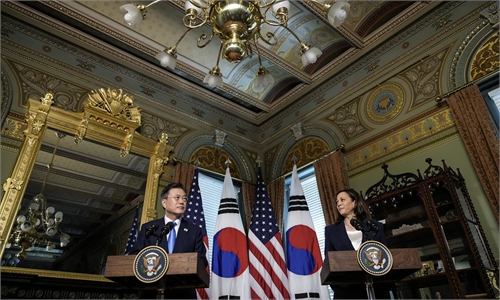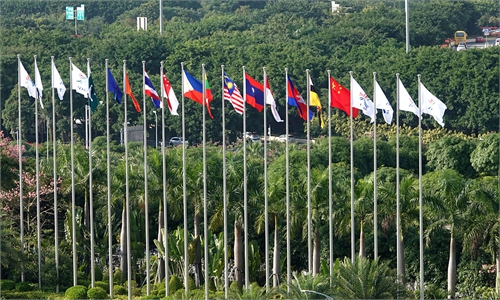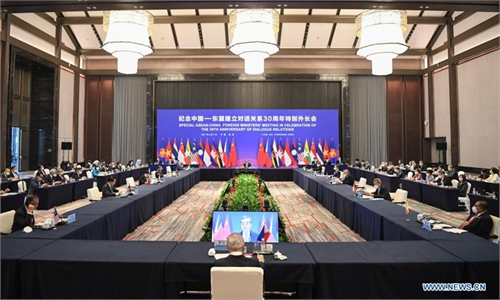
ASEAN flag. Photo: VCG
US Vice President Kamala Harris may probably play the trade card during her trip to Vietnam and Singapore later this month, but it won't shake the supply-chain advantage built based on the close cooperation between China and Southeast Asian countries.
Harris will seek to expand trade relationships with the two countries, with supply chain issues being a major focus, Bloomberg reported on Tuesday, citing an anonymous administration official.
Since Vietnam is forecast to be the fastest-growing ASEAN economy amid the COVID-19 pandemic and Singapore is often seen as a gateway to Southeast Asia for businesses eyeing to establish or strengthen their presence in the region, there is speculation as to whether the vice president will rope in ASEAN into the US' economic net during her trip amid criticism that the Biden administration is losing Southeast Asia to China's economic influence.
While it is still unclear what kind of economic topics Harris will bring to the table during the visit, it is important to point out that if the Biden administration continues to see ASEAN member states as pawns use to squeeze China out of the global supply chains, the economic outcomes of the trip will be extremely limited.
Although the US has been emphasizing the increasing important role of Southeast Asian nations such as Vietnam in many global supply chains, there is no denying that China and Southeast Asia are deeply integrated in terms of industrial infrastructure. China shares common economic interests with those neighboring countries when it comes to consolidating the Asian supply chain's status in the world economy.
Even at a time when global industrial chains have been disrupted by the pandemic, the economic ties between China and other Asian economies have further deepened, not moving toward the opposite direction. ASEAN became China's largest trading partner in 2020, with bilateral trade recording a 38.2 percent growth in the first half of this year, according to Chinese customs data.
In this sense, while the US is also an important trading partner to ASEAN, it would be delusional for it to believe the regional supply chains will develop as it wishes.
Besides, as the White House is reportedly planning to propose a digital trade deal that will cover the Indo-Pacific region, a move widely seen as suppressing China's influence in the region, observers will also seek more clues on the specifics of the deal from Harris' Southeast Asian trip.
Apart from the fact that the relevant negotiations on such a digital trade deal could take years and be extremely difficult, the geopolitical motivation behind the US maneuvering to elbow China out of the regional economic development will instinctively raise the vigilance among Southeast Asian nations that are unwilling to choose sides in the US-China competition.
Finally, the US' dependence on the Asian supply chains is irreversible, and the regional economic integration will develop only in line with economic laws and market rules, not geopolitical interests.



